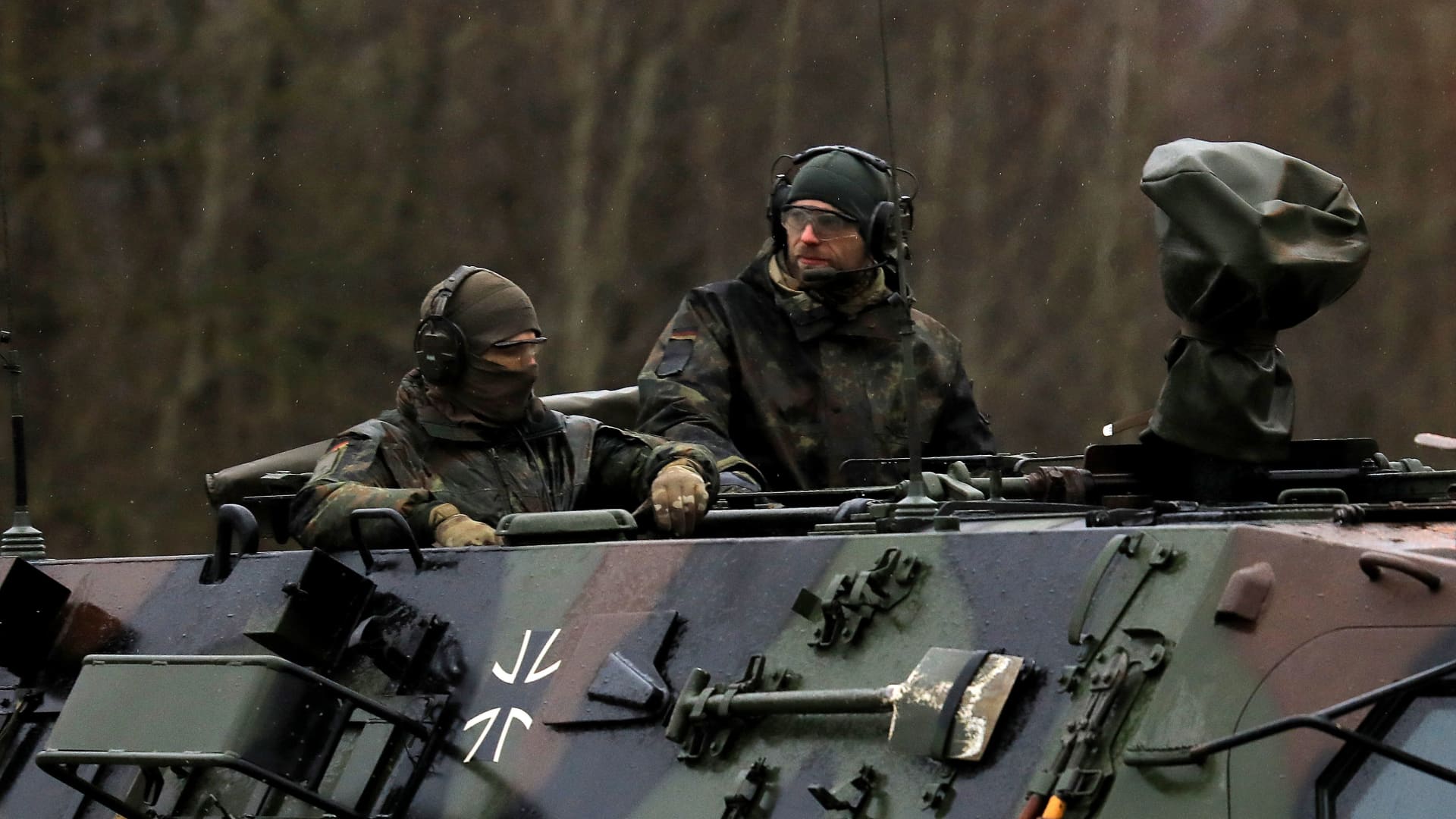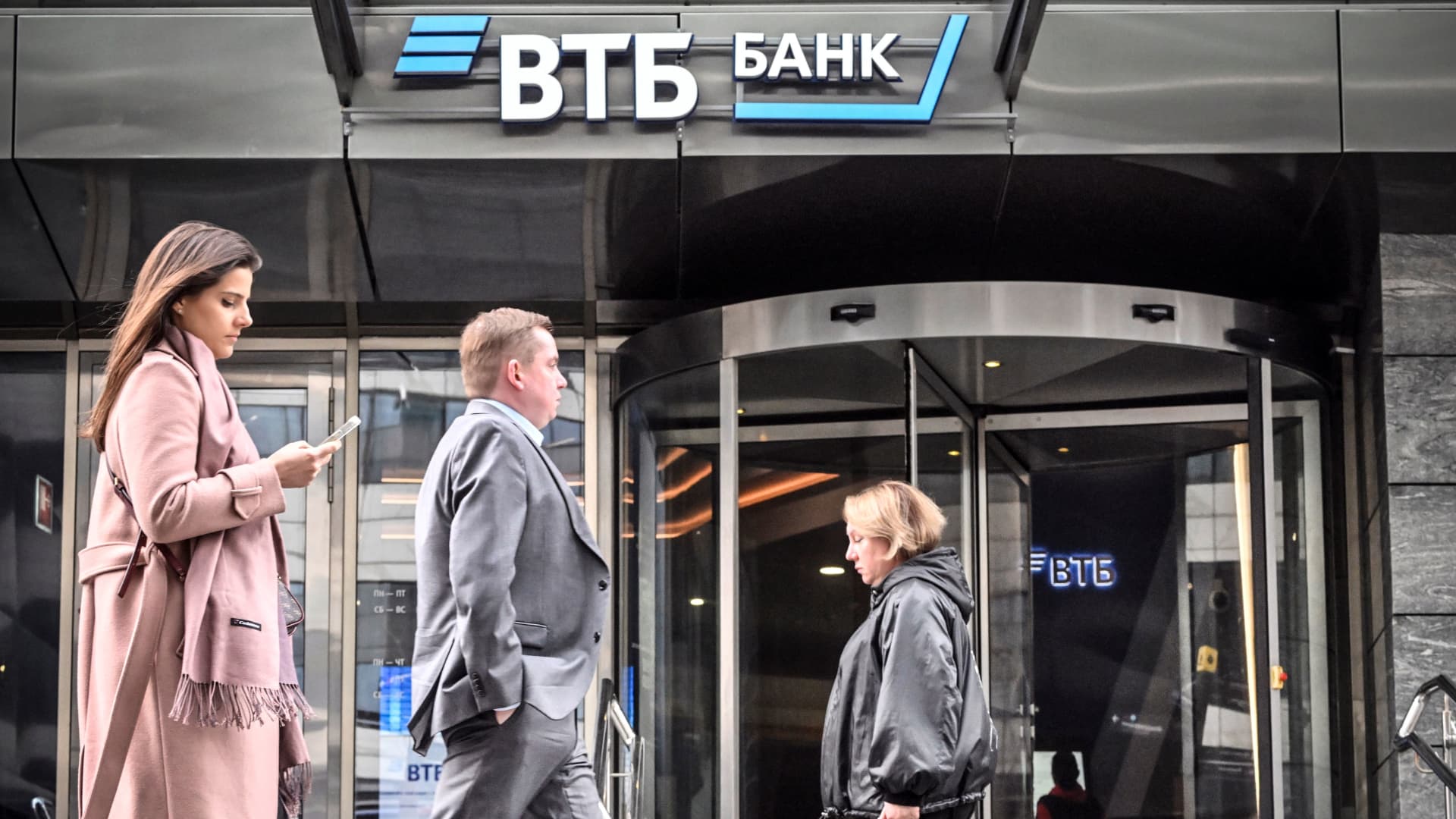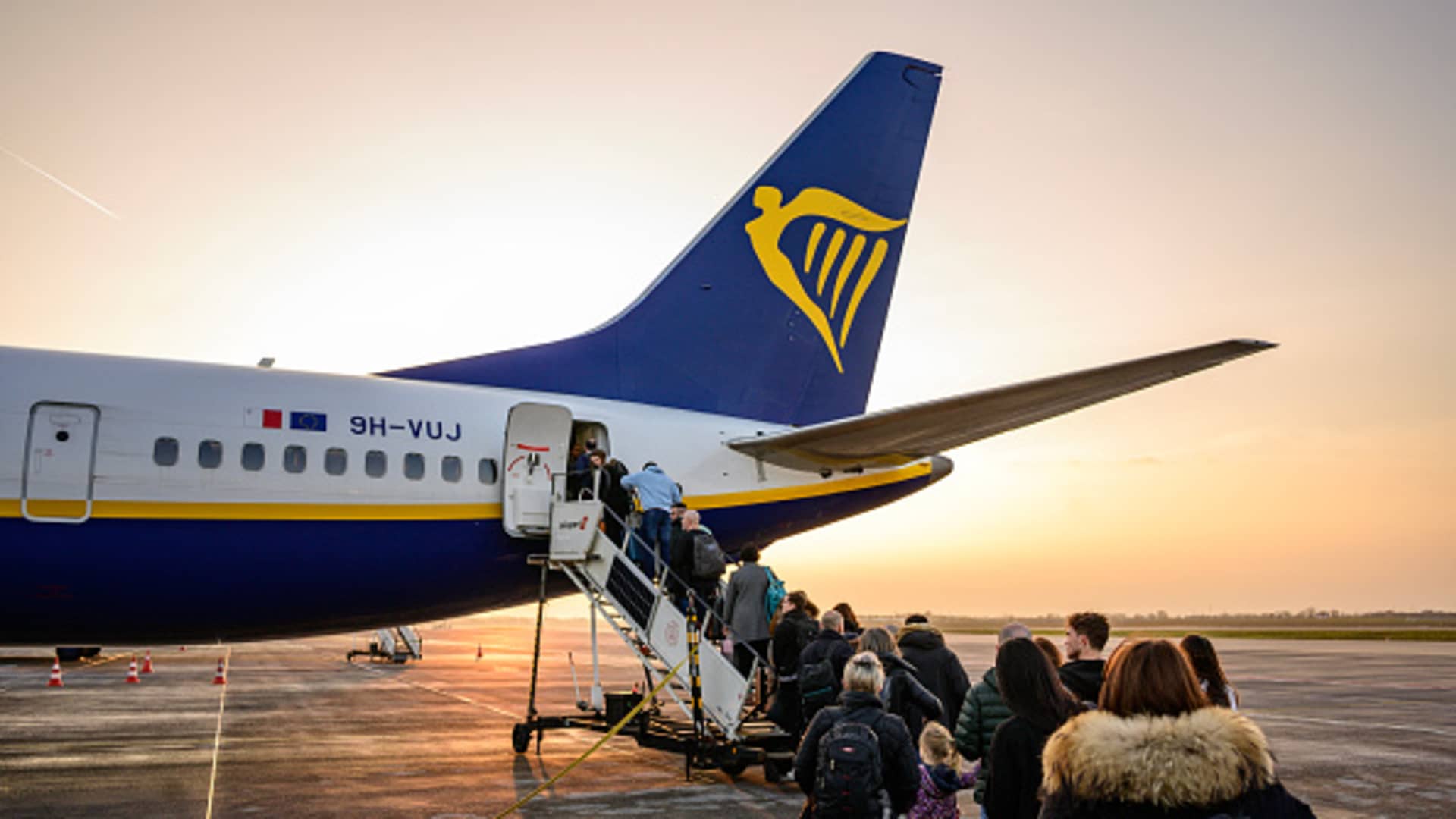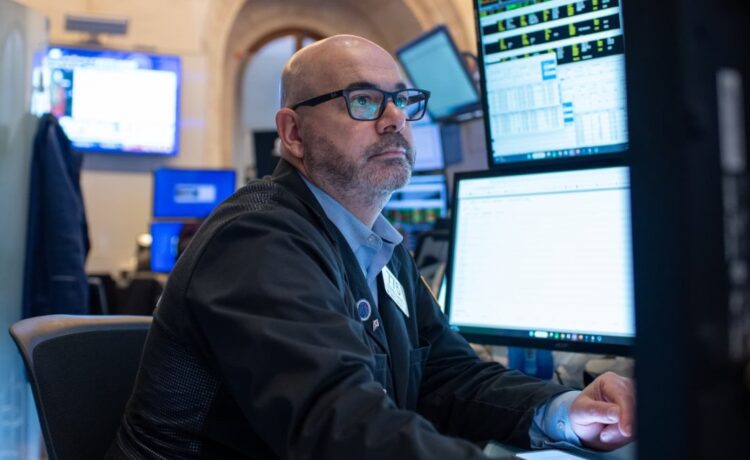This is CNBC’s live blog covering European markets.
European stocks edged higher on Tuesday as corporate earnings and geopolitical developments were in focus.
The pan-European Stoxx 600 index was 0.25% higher at 3:50 p.m. London time, with major bourses in positive territory.
U.K. Prime Minister Keir Starmer pledged to spend an additional £13.4 billion every year from 2027 on defense. In a Tuesday address to parliament he added that the government plants to raise defense spending to 2.5% of the U.K.’s GDP by 2027, noting “the biggest sustained increase in defense spending since the end of the Cold War.”
The U.K.’s biggest defense name BAE Systems‘ share price was up 3.1% following the announcement.
Germany’s Dax index continued moving upward following the result of the German federal election.
The conservative Christian Democratic Union and the allied Christian Social Union (CDU/CSU) secured the largest share of votes in the election on Sunday, with the alliance’s candidate Friedrich Merz set to take over from Olaf Scholz as chancellor of Europe’s largest economy.
In corporate news, Novo Nordisk shares jumped 4% early afternoon. On Monday, American telehealth firm Hims & Hers said in its earnings call that it may stop selling compounded semaglutide — an alternative to weight-loss drugs like Novo Nordisk’s Ozempic and Wegovy.
The Stoxx 600 Healthcare index led sectoral gains on Tuesday, gaining more than 1% on the back of Novo Nordisk’s rally and rises in Smith & Nephew and Zealand Pharma stock.
Medical devices manufacturer Smith & Nephew gained 3.3% after the company reported a 4.7% year-on-year increase in revenue for 2024. It cited its “transformative 12-point plan” as driving the performance and said revenue growth for 2025 was expected to be around 5%.
Earnings also came from Fresenius Medical Care, Heidelberg Materials and Alcon.
Across the Atlantic, U.S. President Donald Trump on Monday said that tariffs on Canadian and Mexican goods “will go forward,” when a 30-day reprieve on the levies expires next week. The president also doubled down on his plans to impose so-called reciprocal tariffs on America’s trading partners.
Asia-Pacific markets traded lower overnight after Wall Street fell Monday as Trump tariffs stoked a risk-off mood. S&P 500 futures were near the flatline on Monday evening after the broad market index was unable to recover from last week’s sell-off.
On Wall Street, stocks opened little-changed ahead of a week of corporate earnings, with Nvidia and Home Depot among the firms slated to update investors on their finances.
UK defense spending increase will require ‘sacrifices elsewhere’: IFS
U.K. Prime Minister Keir Starmer’s pledge to increase defense spending to 2.5% from 2.3% of GDP by 2027 will require tax hikes or spending cuts beyond the already-announced reduction in foreign aid, Ben Zaranko, associate director at the Institute for Fiscal Studies, said in a note Tuesday.
“If the U.K. needs to spend more on defense on a structural and permanent basis, that is not something that can be sustainably borrowed for … If defense spending needs to go higher than 2.5% of GDP, cuts to aid won’t be enough,” Zaranko said.
Zaranko also noted that it was currently unclear how the government produced its figure of a £13 billion ($16.5 billion) annual increase in defense spending, when an extra 0.2% of GDP would total around £6 billion, which would be covered by the cut to the aid budget.
The U.K.’s Labour government announced sweeping tax increases in October as it seeks to meet new fiscal rules ensuring day-to-day government spending is covered by income.
— Jenni Reid
S&P 500 opens flat Tuesday
The S&P 500 began Tuesday’s trading session near the flatline.
Meanwhile, the Dow Jones Industrial Average added 183 points, or 0.4%. The tech-heavy Nasdaq Composite slipped 0.3%.
— Hakyung Kim
Defense stocks rise after UK announces increased defense spending
British defense stocks are up on the Stoxx 600 index after U.K. Prime Minister Keir Starmer announced an increase in defense spending.
British defense giant BAE Systems was up 4% on Tuesday at 2 p.m. London time. Other European defense firms that supply to the UK also rose following the announcement. Leonardo, the Italian-owned defense supplier, was up nearly 3%.
Saab, a Swedish-owned company providing defense and security technology in Britain, was also up nearly 3%. Meanwhile, Rolls-Royce added an almost 2% gain.
— Sawdah Bhaimiya
Potential Trump tariffs ‘definitely not good news,’ Bundesbank chief says
Deutsche Bundesbank President Joachim Nagel on Tuesday told CNBC that potential tariffs being imposed by the U.S. on European countries would not be good news.
Nagel said he was concerned about how the U.S. government’s policy may impact Europe and specifically Germany, noting that there would ultimately be “losers on both sides of the pond.”
“This is definitely not good news,” he said. “On a daily basis I have the impression it’s a very erratic development,” Nagel added.
He pointed out potential spill over effects tariffs could have on inflation developments as well as monetary policy decision making, saying that this is why he backed a meeting by meeting approach.
Many economists regard tariffs as inflationary. Duties have not yet been imposed on imports from Europe to the U.S., but U.S. President Donald Trump has repeatedly suggested that they are on the horizon. Germany could be one of the countries most exposed to tariffs if they are implemented as exports are a key pillar for its economy.
— Sophie Kiderlin
UK pledges to spend £13.4 billion more on defense every year from 2027
U.K. Prime Minister Keir Starmer said on Tuesday that the country will spend £13.4 billion ($17 million) more on defense every year from now until 2027, in an effort to boost national security.
Starmer said he plans to raise defense spending to 2.5% of the U.K.’s GDP by 2027, noting that the changes will see the government “begin the biggest sustained increase in defense spending since the end of the Cold War.”
The prime minister also set out a plan to increase defense spending to 3% of GDP in the next parliament. The country faces “enemies that are sophisticated in cyber-attacks, sabotage, even assassination,” he said during an address in parliament.
The government will be putting in place a new “defense reform and efficiency plan” jointly led by Chancellor Rachel Reeves and Defense Secretary John Healey.
“The nature of warfare has changed significantly, that is clear from the battlefield in Ukraine, so we must modernize and reform our capabilities as we invest,” Starmer said.
“This investment means that the U.K. will strengthen its position as a leader in NATO and in collective defense of our continent and we should welcome that role. It is good for our national security. It is also good for the ambition of this government to restore growth to our economy and we should be optimistic on what it can deliver on those terms,” he added.
— Sawdah Bhaimiya
Germany’s election could further boost Europe’s defense sector, analysts say

Soldiers of the German armed forces Bundeswehr arrive in an armoured vehicle at the NATO enhanced Forward Presence Battle Group Battalion in Lithuania in Rukla, Lithuania on February 17, 2022.
Germany headed to the polls on Sunday for the country’s federal election, paving the way for a new coalition government that some market watchers expect could further strengthen Europe’s flourishing defense sector.
Preliminary results on Monday showed the allied Christian Democratic Union and Christian Social Union (CDU/CSU) parties achieved the biggest majority, winning a combined 28.6% of votes. The far-right AfD won 20.8% of the votes, the data showed, while incumbent Chancellor Olaf Scholz’s Social Democratic Party (SPD) came in third with just 16.4%.
— Chloe Taylor
Russia’s VTB Bank announces record full-year profits

People walk past a branch of Russian VTB bank in Moscow on April 5, 2023. – Russia’s second-largest bank, VTB, reported a huge loss amounting to $7.7 billion in 2022 after it was hit hard by Western sanctions over Moscow’s offensive in Ukraine.
VTB Bank, Russia’s second-biggest lender, reported a 27.6% year-on-year rise in annual net profit on Tuesday, with the figure for 2024 coming in at 551.4 billion rubles ($6.4 billion).
Chief Financial Officer Dmitry Pianov said in a news release that it marked a record result for the bank, with profitability bolstered by a growing loan portfolio and a record expansion in retail customers. However, the company noted that tighter monetary policy — the Bank of Russia has held its key interest rate at 21% since October — led to a deceleration in its lending growth as the year progressed.
VTB’s 2024 result marked a continued financial recovery for the lender, topping the record profit it reported a year earlier. In 2022, VTB reported a 667.5 billion ruble loss after the lender was hit by international sanctions imposed in response to Russia’s full-scale invasion of Ukraine.
— Chloe Taylor
German export expectations improve but remain in negative territory, Ifo Institute says
In a report out Tuesday, Munich’s Ifo Institute said that German businesses became slightly less pessimistic about foreign sales prospects in February, with the thinktank’s Export Expectations indicator a rise to -5 points from -7.1 points a month earlier.
Despite the slight uptick, Ifo noted that the figure has been in negative territory for almost two years, with “only a few sectors” — including furniture manufacturers, beverage makers and the autos sector — projecting international sales will pick up.
German machinery manufacturers and the country’s chemicals sector were expecting a slight decline in international sales, Ifo’s data showed.
The data was derived from survey responses from around 2,100 firms.
— Chloe Taylor
Ryanair CEO predicts summer fare rise of up to 6%

Passengers wait to board an aircraft of low cost Irish airline Ryanair at the Berlin-Brandenburg airport in Schoenefeld near Berlin, Germany, on March 13, 2024.
Ryanair CEO Michael O’Leary on Tuesday said that the budget airline expects fares to be 4% to 6% higher this summer than in the same season of 2024, in comments cited by news agency Reuters.
Dublin-listed shares of the company were trading flat at 10:14 a.m. London time.
— Chloe Taylor
Smith & Nephew’s shares jump 8% after posting 5% jump in revenue
Smith & Nephew shares jumped 8% at the open after the British medical technology company reported its full-year results.
Annual revenue rose to $5.8 billion in 2024, a 4.7% rise from the $5.5 billion reported in 2023, the company said in a Tuesday statement. Meanwhile, trading profit increased 8.2% to just over $1 billion in 2024, up from $970 million in 2023.
The company noted an improvement in demand for its U.S. hip implant and knee implant products which helped offset a decline in China. It’s expecting underlying revenue growth of around 5% in 2025, compared to growth of 4.8% in 2024.
“We have been driving a three-year turnaround, we’re two years into that turnaround, and we’ve been very pleased with the results. So far, Q4 was strong with a strong finish to the year and we delivered above five percent growth, which is higher than our historical average of about two to three percent growth,” Smith & Nephew CEO Deepak Nath told CNBC in an interview on Tuesday.
“We’re looking forward to in 2025, the accumulated benefits, and all the operational improvements we made in 2024 to deliver exceptional returns financially,” Nath added.
— Sawdah Bhaimiya
Watch: Heidelberg Materials CEO discusses full-year results
Fresenius Medical Care ‘tariff taskforce’ set to deal with Trump uncertainty, CEO says
German healthcare company Fresenius Medical Care said Tuesday that it has installed its first-ever “tariff taskforce” to manage uncertainty surrounding U.S. President Donald Trump’s proposed import charges.
CEO Helen Giza told CNBC that her business was somewhat insulated from possible trade levies, with some U.S.-based manufacturing. However, she noted that charges on EU imports could hit items such as its dialysis machines and consumable products.
“Clearly we’re looking at what happens to the tariffs in Europe and what also happens to tariffs [on] medical equipment,” she said.
“The escalation and speed of this with the executive orders is something we assembled pretty quickly,” Giza added. She noted that the taskforce had an expanded remit to the company’s regular trade team and was trying to understand the implications of levies and “what the potential scenarios could be.”
— Karen Gilchrist
German economy shrank 0.2% in final quarter of 2024
Germany’s economy contracted 0.2% quarter-on-quarter in the final three months of 2024, the country’s Federal Statistical Office said on Tuesday, confirming a preliminary reading out at the end of January.
The fourth-quarter performance followed quarterly growth of 0.1% over the July-September stretch.
Officials cited significant export declines and an ongoing slump in manufacturing output among the headwinds facing the German economy at the end of last year.
— Chloe Taylor
Unilever CEO Schumacher to step down

Tubs of Ben & Jerry’s ice cream in a store freezer.
Unilever CEO Hein Schumacher is stepping down after less than two years in the job, the company said Tuesday, with current CFO Fernando Fernandez set to take his place leading the company.
Schumacher — who took the reins in July 2023 and was tasked with leading the overhaul of the consumer goods giant — will stand down as CEO and board director in March and will leave the company on May 31. His departure is taking place by mutual agreement, the consumer goods firm said.
Fernandez’ new role will take effect March 1.
Unilever said there was no change to its 2025 outlook or the company’s medium-term guidance following this announcement.
“On behalf of the Board, I would like to thank Hein for resetting Unilever’s strategy, for the focus and discipline he has brought to the company and for the solid financial progress delivered during 2024,” Unilever Chairman Ian Meakins said in a statement.
“While the Board is pleased with Unilever’s performance in 2024, there is much further to go to deliver best-in-class results. Having worked with Fernando closely over the last 14months, the Board is very confident in his ability to lead a high performing management team, realize the benefits of the GAP [Growth Action Plan] with urgency, and deliver the shareholder value that the company’s potential demands,” Meakins added.
Srinivas Phatak, Unilever’s current deputy CFO and group controller, will take over as interim CFO. An internal and external search now being initiated to permanently fill the role, the company added.
— Karen Gilchrist
Markets relieved by German election result, but key industries remain mired in uncertainty
Frankfurt’s DAX index gained 0.6% Monday, outpacing a flat U.K. FTSE 100 and 0.78% loss for France’s CAC 40, while the euro nudged higher against the U.S. dollar and British pound and German borrowing costs were little-changed.
Germany’s election delivered a victory for the conservative alliance of the Christian Democratic Union (CDU) and Christian Social Union (CSU). That has set up CDU-CSU candidate Friedrich Merz — a center-right, pro-business politician who serves on the boards of EY Germany and the Deutsche Börse — as near-certain to take over as the next chancellor.
Some uncertainty remains however, with a period of coalition talks ahead and a future in which support of smaller parties will be needed to enact promised policies including reform of Germany’s contentious “debt brake” rule.
— Jenni Reid
European markets: Here are the opening calls
European markets are expected to open in mixed territory Tuesday.
The U.K.’s FTSE 100 index is expected to open unchanged at 8,637, Germany’s DAX down 29 points at 22,381, France’s CAC 2 points lower at 8,084 and Italy’s FTSE MIB 27 points higher at 38,542, according to data from IG.
Earnings come from Fresenius Medical Care, Smith & Nephew, Heidelberg materials and Alcon. On the data front, final fourth-quarter German gross domestic product data will be released.
— Holly Ellyatt














